Private Limitation of Action Enforced
Seventh Circuit Applies Contractual Limitation of Action Provision
Late Filing Defeats Suit
In Waseem Daker v. State Farm Fire And Casualty Company, No. 21-3210, United States Court of Appeals, Seventh Circuit (February 3, 2023), more than a year after he suffered property damage, Waseem Daker sued State Farm Fire and Casualty Company for insurance coverage, despite knowing that his policy with State Farm required that he file suit within a year of loss. The district court granted State Farm's motion to dismiss. It ruled that the policy's provision was enforceable, and Daker's suit was time-barred.
FACTS
Daker, who had been in prison in Georgia for over a decade, maintained ownership of a home in Georgia. According to Daker, the property was insured by State Farm, a company incorporated in Illinois. Daker alleges that two incidents warrant coverage: First, tenants "abused and vandalized" the home through June 2017; then, in January 2018, Daker's brother burglarized the home, damaging it further.
Daker filed two insurance claims with State Farm for the damage to his property (one claim relating to each incident). State Farm denied both claims. In the denial letter, which Daker received in March 2018, State Farm alerted Daker to the provision of his insurance policy that required him to sue within one year of the dates of damage, it provided:
Suit Against Us. No action shall be brought unless there has been compliance with the policy provisions and the action is started within one year after the date of loss or damage.
About two years later, in February 2020, Daker sued in a federal court in Illinois, asserting diversity jurisdiction. As relevant on appeal, he alleged that State Farm breached its insurance policy by declining coverage for his property damage. Daker conceded that he sued past the one-year limitations period in his contract with State Farm, but he argued that the period did not matter because, among other reasons, the provision was unreasonable, and State Farm had misled him about it.
After permitting Daker to amend his complaint three times, the district court granted State Farm's motion to dismiss it, with prejudice. Moreover, Daker lacked a valid defense to the provision, given that State Farm told him of it in denying his claims. The one-year limitations provision barred Daker's suit, which he filed nearly two years after the most recent date of property damage.
Daker contended that his complaint was not time-barred because promissory estoppel, equitable estoppel, and equitable tolling defeat the limitations defense. Daker relied primarily on his argument in his motion for reconsideration that State Farm never delivered to him a copy of the policy that he says he needed to timely sue. He contacted his State Farm agent in early 2018 to ask for another copy of his insurance policy, and she promised to send it to him, but never did. Daker contends that he detrimentally relied on the State Farm agent's promise, so that promissory and equitable estoppel should toll the limitations period. Daker adds that equitable tolling also applies because he was unable for a time to access his prison's law library, which he also needed to prepare his complaint.
ANALYSIS
Under Illinois law, limitations rules - and defenses to it - are governed by the law of the forum. Illinois's law regarding the validity of contract terms that displace statutes of limitations, and tolling, such a contract term is upheld if it was accepted knowingly and voluntarily, is reasonable, and is consistent with public policy. Georgia law, which Daker prefers, is similar: these provisions are generally enforced if they are not unconscionable or so unreasonable that they raise a presumption of undue advantage. An equitable-tolling defense requires a showing that, despite exercising due diligence, Daker could not discover the facts essential to his claim within the limitations period.
The one-year limitations provision in State Farm's policy is valid.
The provision is reasonable because it allowed Daker sufficient time to sue after his dates of loss. He knew about the deadlines because State Farm notified him of the limitation in its denial of his claim and it reminded him about the one-year deadlines.
Daker asserted that he needed the policy to help him prepare his complaint, but his own actions refuted that assertion: He successfully prepared and filed his complaint without the promised copy of the policy, and no one has suggested that his complaint inadequately alleges breach of contract.
He also based the defense on his inability to access his prison's law library. But he did not need the library to allege that State Farm breached its contract, which he told the court he knew when he received the letters from it declining coverage.
ZALMA OPINION
State Farm took no chances with the litigious felon, Daker, by not only denying his claims in writing and warning him - as state Regulations require - that the policy contained a one-year private limitations of action provision. Daker ignored the warning and with the ingenuity of a jail-house-lawyer claims that equity required the limitation provision to be ignored because State Farm did not provide a copy of the policy and Georgia did not give him access to the prison law library. Both arguments failed because without the policy or the law library he filed an effective law-suit, but filed it too late. Because the District Court gave Daker three attempts to plead a viable cause of action State Farm was required to pay a great deal of money to counsel to defend the allegations and waste the time of the court, perhaps because, Daker was bored after serving ten years in prison.
(c) 2023 Barry Zalma & ClaimSchool, Inc.
Subscribe and receive videos limited to subscribers of Excellence in Claims Handling at locals.com https://zalmaoninsurance.locals.com/subscribe.
Go to substack at substack.com/refer/barryzalma Consider subscribing to my publications at substack at substack.com/refer/barryzalma
Barry Zalma, Esq., CFE, now limits his practice to service as an insurance consultant specializing in insurance coverage, insurance claims handling, insurance bad faith and insurance fraud almost equally for insurers and policyholders. He practiced law in California for more than 44 years as an insurance coverage and claims handling lawyer and more than 54 years in the insurance business. He is available at http://www.zalma.com and zalma@zalma.com
Write to Mr. Zalma at zalma@zalma.com; http://www.zalma.com; http://zalma.com/blog; daily articles are published at https://zalma.substack.com. Go to the podcast Zalma On Insurance at https://anchor.fm/barry-zalma; Follow Mr. Zalma on Twitter at https://twitter.com/bzalma; Go to Barry Zalma videos at Rumble.com at https://rumble.com/c/c-262921; Go to Barry Zalma on YouTube- https://www.youtube.com/channel/UCysiZklEtxZsSF9DfC0Expg; Go to the Insurance Claims Library – https://zalma.com/blog/insurance-claims-library
-
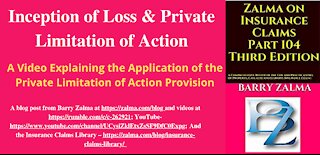 19:20
19:20
Barry Zalma, Inc. on Insurance Law
2 years agoA Video Explaining the Application of the Private Limitation of Action Provision
54 -
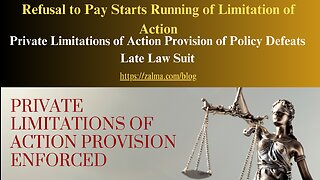 8:23
8:23
Barry Zalma, Inc. on Insurance Law
10 months agoRefusal to Pay Starts Running of Limitation of Action
57 -
 0:57
0:57
The Last Capitalist in Chicago
11 months agoWhat happens if you get sued for more than your policy limit?
28 -
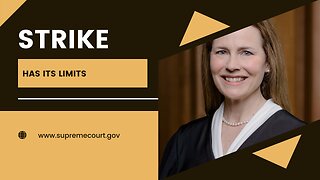 27:53
27:53
Declarations of Truth
1 year agoA strike has its limits
1831 -
 51:55
51:55
tErPwErKz710
5 months agoLimitations of Law Implemented by Bribery From Industries Monetary Elite
771 -
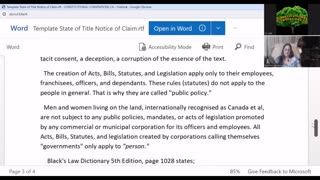 14:31
14:31
We The People - Constitutional Conventions
3 months agoNotice of Demand and Trespass Proof of Jurisdiction and Contract
9352 -
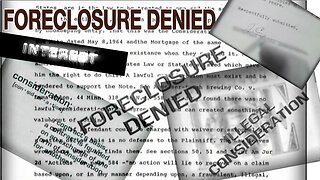 4:19
4:19
RAVries
1 year agoFORECLOSURE DENIED - HOW TO STOP THE COUNTERFEITING BANKING MAFIA FROM FORECLOSING ON YOUR HOUSE!!
749 -
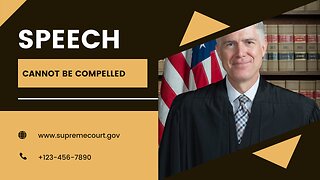 21:40
21:40
Declarations of Truth
11 months agoSpeech cannot be compelled – SCOTUS
572 -
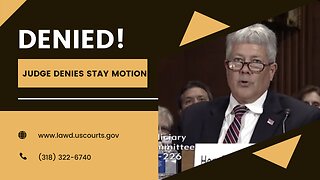 21:02
21:02
Declarations of Truth
11 months agoStay of injunction denied
482 -
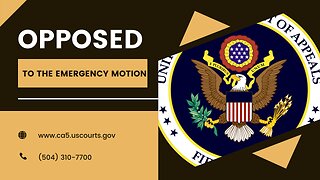 20:27
20:27
Declarations of Truth
11 months agoPlaintiffs oppose emergency motion
264